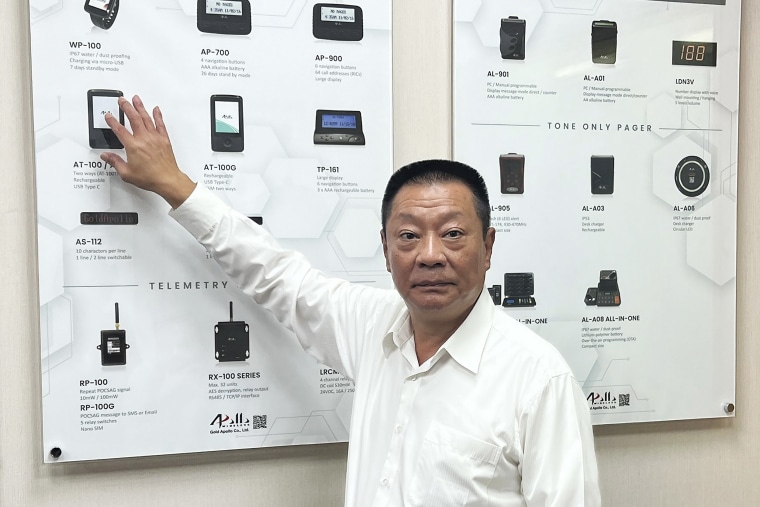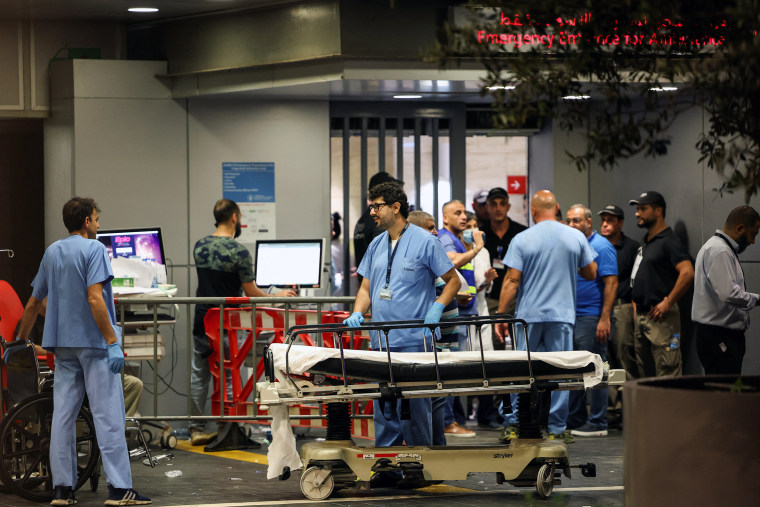HONG KONG — An electronics maker in Taiwan said Wednesday that a Hungary-based company manufactured its brand of pagers used by members of the militant group Hezbollah that exploded simultaneously in Lebanon on Tuesday.
According to the Lebanese Health Ministry, at least 12 people were killed and more than 2,750 others injured in the attacks. In a statement on Wednesday, the Iran-backed Hezbollah announced a “harsh reckoning” for the attacks and blamed Israel for them.
Israel has not directly commented on the explosions, but two U.S. officials and a senior Middle East diplomat told NBC News that Israel was behind the attack.
Pictures circulating online show destroyed pagers in Lebanon with features matching those of Taiwan’s Gold Apollo. The company’s founder and president, Hsu Ching-kuang, told reporters on Wednesday that the pagers were made by another company that has a license to use its brand.
“There is a representative in Europe who we have been working with for three years. He represents all of our products,” Hsu said at the company’s office in the northern Taiwanese city of New Taipei. “We are not a big company, but we are a responsible company that cares about our products,” he said.
In a statement, Gold Apollo identified the other company as Hungary-based BAC Consulting. The company is authorized to use Gold Apollo’s logo for product sales in certain regions, “but the design and manufacture of the products are entirely in the hands of BAC,” the statement said.
Cristiana Bársony-Arcidiacono, managing director of BAC Consulting, confirmed by phone on Wednesday that her company was working with Gold Apollo. But when asked about the pagers and the explosions, she said: “I don’t make the pagers. I’m just the intermediary. I think you’ve misunderstood.”
According to the documents of the Hungarian Ministry of Justice, a company called BAC Consulting was registered as a new company on May 21, 2022. The main activities listed were retail trade in telecommunications products, as well as business consulting, jewelry manufacturing and fruit growing.
An entry dated May 2, 2020 suggests that a company of the same name previously existed, which was closed in 2020.
Zoltan Kovacs, a spokesman for the Hungarian prime minister, told X that authorities had confirmed that BAC Consulting was a commercial intermediary that neither produces nor operates in Hungary and that “the devices mentioned have never been in Hungary.”
He stressed that this case posed “no risk to the national security” of the country.
A Gold Apollo spokesman declined to comment further on Wednesday, citing ongoing investigations.

Taiwan’s Ministry of Economic Affairs said Wednesday that Gold Apollo had exported 260,000 pagers from 2022 to August 2024, mainly to European and American markets. It said in a statement that there had been no reports of explosions related to these products and there was no record of the company exporting pagers directly to Lebanon. “Was this batch of goods actually altered? … Did another manufacturer produce them and simply mark them with the Apollo brand? This part is still under investigation by the authorities,” a ministry spokesman told NBC News.
Tuesday’s explosions came amid growing fears that tensions between Israel and Lebanon could escalate into all-out war. Israel and Hezbollah, which is based in Lebanon and opposes Israel’s military assault on the Gaza Strip, have been involved in cross-border attacks since the Israel-Hamas war began last October, causing thousands of people to flee their homes in both countries.
The Lebanese Foreign Ministry condemned the so-called “Israeli cyberattack” and announced that it would file a complaint with the UN Security Council.
Jeanine Hennis-Plasschaert, the UN special coordinator for Lebanon, said on Tuesday that the explosions marked “an extremely worrying escalation in an already unacceptably unstable context.”
US State Department spokesman Matthew Miller said on Tuesday that the US had “no prior knowledge of this incident” and was not involved in it.
However, two U.S. officials told NBC News that Israel was behind the attack, while a senior Middle East diplomat, when asked about the pager attack, said, “This is undoubtedly an Israeli operation.” The United States and other Western governments are still gathering information about the attack and how it was carried out, two U.S. officials and one Western official said.
It is unclear why Israel carried out the attack at that time and whether it was an opportunistic operation or a more strategic matter that would be followed by further actions, the officials said.
Officials did not confirm reports that the explosives may have been tampered with and intended to detonate.

Videos suggest the pagers had explosive devices embedded in them, said NR Jenzen-Jones, director of Armament Research Services, a technical intelligence consulting firm. “The scale suggests a complex attack along the supply chain rather than a scenario where the explosive devices were intercepted and modified during transit,” he said on X.
Pagers are favored by Hezbollah members who avoid cellphones because they fear Israel could use them to track and monitor them. Lebanese authorities warned people on Tuesday to avoid their wireless communication devices until further notice.
Hezbollah said it was investigating the explosions and that there would be a “harsh reckoning that the criminal enemy will have to face for the massacre it committed on Tuesday against our people, our families and our fighters in Lebanon.”
The group had previously stated that the victims of the explosions included “a girl and two brothers.” Some of these events were apparently captured on surveillance camera footage and shared on social media. Muhammad Mahdi, the son of Ali Ammar, a Hezbollah member of parliament, was also reportedly killed.
Hsu of Gold Apollo said he also felt victimized and was considering filing a lawsuit.
“I’m a businessman,” he said. “How did I get involved in this attack?”

